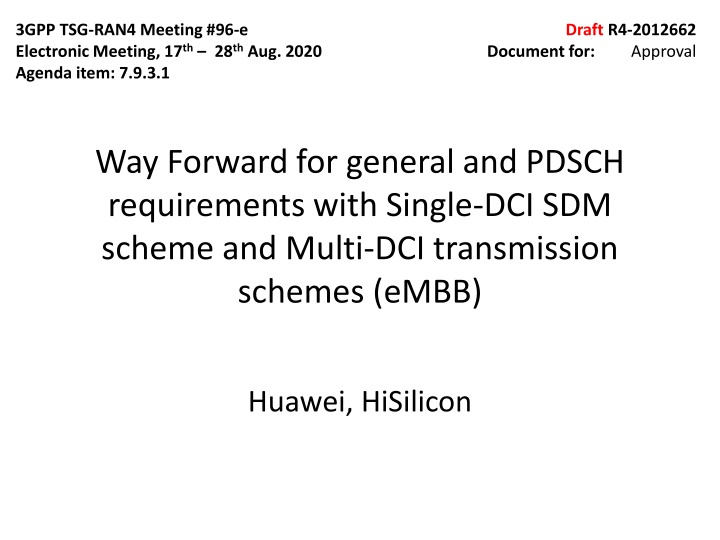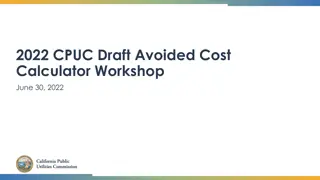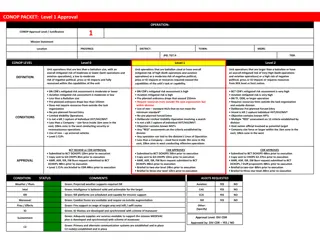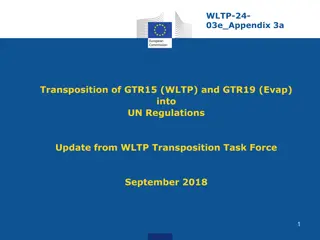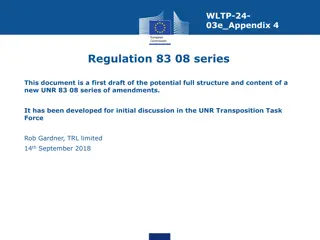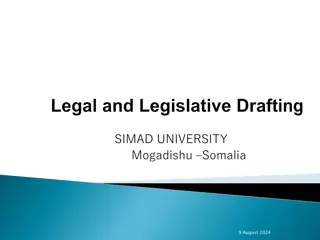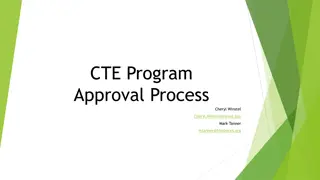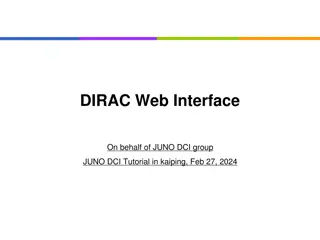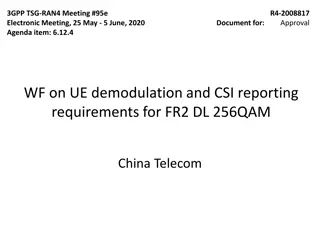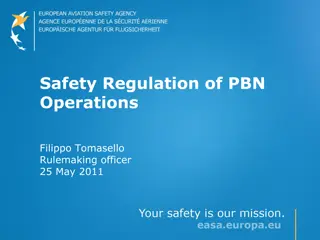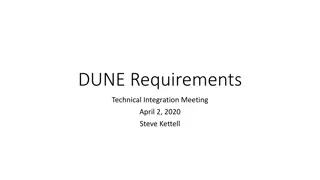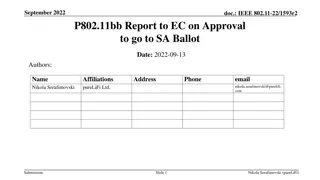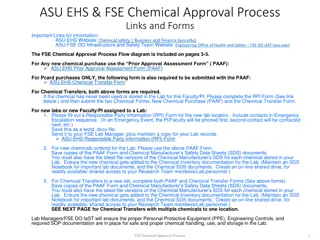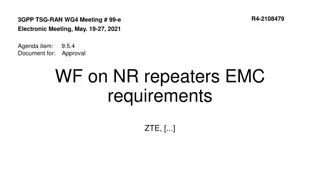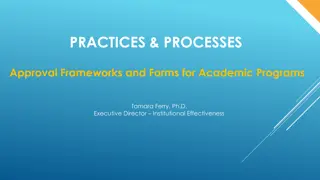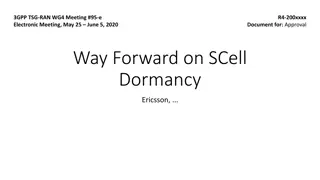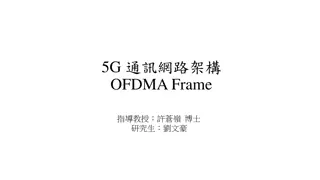Draft Approval Document for General and PDSCH Requirements with Single-DCI and Multi-DCI Transmission Schemes
This document discusses performance requirements and test setups for PDSCH requirements in the context of eMBB, focusing on multi-panel/TRP in FR1, timing offsets, frequency offsets, TRS/CSI-RS configurations, and resource allocation for Multi-DCI based PDSCH requirements.
Download Presentation

Please find below an Image/Link to download the presentation.
The content on the website is provided AS IS for your information and personal use only. It may not be sold, licensed, or shared on other websites without obtaining consent from the author.If you encounter any issues during the download, it is possible that the publisher has removed the file from their server.
You are allowed to download the files provided on this website for personal or commercial use, subject to the condition that they are used lawfully. All files are the property of their respective owners.
The content on the website is provided AS IS for your information and personal use only. It may not be sold, licensed, or shared on other websites without obtaining consent from the author.
E N D
Presentation Transcript
3GPP TSG-RAN4 Meeting #96-e Electronic Meeting, 17th 28thAug. 2020 Agenda item: 7.9.3.1 Draft R4-2012662 Approval Document for: Way Forward for general and PDSCH requirements with Single-DCI SDM scheme and Multi-DCI transmission schemes (eMBB) Huawei, HiSilicon
Background Agreed WF in the previous meetings: R4-2002419 WF on demodulation and CSI requirement for NR eMIMO, RAN4#94-e R4-2002420 WF on PDSCH demodulation requirements based on multi-TRP transmission for NR eMIMO, RAN4#94-e R4-2005529 WF on PDSCH demodulation requirement and General aspects for NR eMIMO, RAN4#94-e-Bis R4-2008813 WF for general and PDSCH requirements with single-DCI SDM scheme and Multi-DCI transmission schemes (eMBB), RAN4#95-e
General test set-up for PDSCH requirements Reference for timing offset/frequency offset Using TP1 is Reference to define timing and frequency offset Timing offset = time offset among TP2 and TP1 Frequency offset = frequency offset among TP2 and TP1 Baseline receiver assumption for FFT window timing It s up to UE implementation for FFT windowing timing adjustment strategy; Define performance requirements in receiver agnostic manner. Meanwhile define RAN4 performance requirements based on the assumption of UE sets FFT timing based on TCI state #0 (TP1 i.e. SSB only transmitted from TP1).
General test set-up for PDSCH requirements Timing offset among multi-panel/TRP (FR1 only) FR1 FDD with 15kHz Positive timing offset: 2us Negative timing offset: -0.5us FR1 TDD with 30kHz Positive timing offset: Option 1: 2us (Intel) Option 2: 1us (Samsung, Huawei, Ericsson, Qualcomm, Apple) Negative timing offset Option 1: -0.5us (Intel) Option 2: -0.25us (Samsung, Huawei, Ericsson, Qualcomm, Apple)
General test set-up for PDSCH requirements TRS/CSI-RS configuration Introduce the test cases with only non-colliding TRS/CSI-RS in multi-TRP/panel
Multi-DCI based PDSCH requirements Resource allocation Introduce only non-overlapping cases Antenna configuration per each TRP Only 2T2R, 2T4R
PDSCH requirements Number of test cases for single-DCI/multi-DCI Option 1: 4 test cases per duplex mode with test applicability rule (Samsung) Test 1a Single-DCI with frequency offset and negative time offset and overlapping scheduling Test 1b Single- DCI with positive time offset and overlapping scheduling Test 2a Multi- DCI with frequency offset and negative time offset and non- overlapping scheduling Test 2b Multi DCI with positive time offset and non-overlapping scheduling Test applicability rule UE only supports single-DCI based multi-TRP transmission for eMBB, it should be tested with test case 1a and test case 1b If UE only supports multi-DCI based on multi-TRP transmission for eMBB, not support single DCI, it should be tested test 2a and test 2b. If UE supports both single-DCI and multi-DCI based on multi-TRP transmission for eMBB, it should be tested test 2a and either test 2b or test 1b
PDSCH requirements (continue) Number of test cases for single-DCI/multi-DCI Option 2: 3 test cases per duplex mode with test applicability rule (Samsung) Test 1a Single-DCI with frequency offset and negative time offset and overlapping scheduling Test 1b Single- DCI with positive time offset and overlapping scheduling Test 2a Multi- DCI with frequency offset and negative time offset and non- overlapping scheduling Test applicability rule If UE only supports single-DCI based multi-TRP transmission for eMBB, it should be tested with test case 1a and test case 1b If UE can support both single-DCI and multi-DCI for eMBB, it should be tested test 2a and test 1b Option 3: 2 test case per duplex mode (Huawei, Qualcomm, Intel, Ericsson, Apple) Test 1a Multi- DCI with frequency offset, [negative time offset] or [positive time offset] and non-overlapping scheduling Test 1b Single-DCI with frequency offset, [positive time offset] or [negative time offset] and overlapping scheduling
Performance requirements for multi-panel/TRP in FR2 No PDSCH demodulation requirements with multi- Panel/TRP transmission schemes under single Tx/Rx beam with same QCI Type-D in FR2 for Rel-16 Considering current OTA Test limitation for demodulation test cases, no test cases for multi-TRP transmission with multi-Tx beams in TDM manner (URLLC TDM scheme) in Rel-16; and further discuss in future release with consideration of test ability issue
